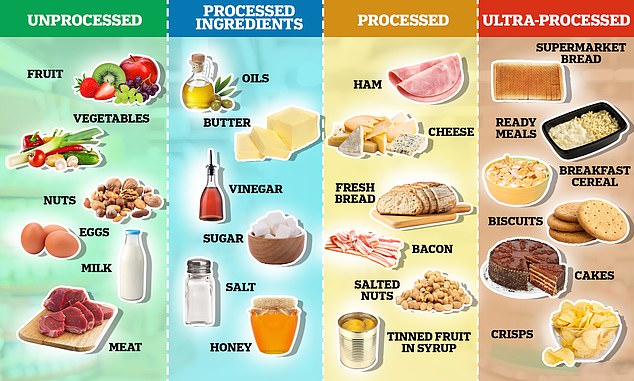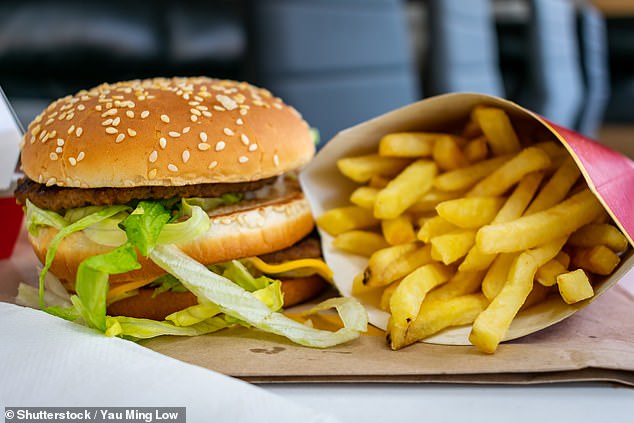Replacing meat and dairy with plant-based substitutes may not be the easy health hack you think.
Although eating fresh vegetables is linked to a lower risk of cardiovascular disease, you may want to reconsider how many vegan burgers and pies you eat.
Scientists found that opting for ultra-processed plant-based products, such as burgers with vegan sausages intended to replace animal-based foods, as well as cakes and chips, is linked to a 15 percent higher risk of heart attacks and strokes.
This is according to the analysis of the diets of more than 118,000 participants in the UK Biobank study.
Ultra-processed foods, full of fat, salt and sugar, have long been vilified for increasing the risk of heart attacks and strokes.
Although eating plant-based foods is associated with a lower risk of cardiovascular disease, you may want to reconsider how many vegan burgers you eat, as researchers say UPF foods could increase your risk.
Now, research published in Lancet Regional Health – Europe suggests that these dangers are present even in plant-based UPFs, with high consumption linked to a 15 percent increase in cardiac death.
The research, in which experts from Imperial College London participated, used data from mMore than 118,000 Britons, aged between 40 and 69, evaluated their diet for at least two days.
Scientists divide foods into products of plant origin, such as fruits, vegetables, cereals, bread, as well as cakes and sweets, and products of animal origin, such as fish, poultry, red meat, eggs and dairy products.
The two groups were then divided into ultra-processed (UPF) and non-ultra-processed.
These data were then linked to hospital and mortality records to obtain information on cardiovascular disease.

An easy sign that a food might be UPF is if it contains ingredients you wouldn’t find in your kitchen cupboard, such as unrecognizable dyes, sweeteners, and preservatives. Another clue is the amount of fat, salt and sugar hidden inside each package, and UPFs usually contain high amounts.
People who ate a lot of ultra-processed plant-based foods had a 7 percent higher risk of conditions such as blocked heart vessels and a 15 percent higher risk of dying compared to vegetarians whose diets contained less.
Increasing consumption of unprocessed vegetarian foods, such as fresh fruits and vegetables, by 10 percent was associated with an 8 percent lower risk of heart disease.
Deaths from heart disease were reduced by a fifth among vegetarians who consumed the least amount of UPF and by 13 percent in cardiovascular diseases overall, caused by the buildup of fatty deposits within the arteries.
Study co-author Dr Eszter Vamos, from the School of Public Health at Imperial College London, said: “Fresh plant-based foods, such as fruits and vegetables, whole grains and legumes, are known to have important health benefits. health and the environment.
“While ultra-processed foods are often marketed as healthy foods, this large study suggests that plant-based ultra-processed foods do not appear to have protective health effects and are linked to poor health outcomes.”
Scientists suggest that food additives and industrial contaminants present in these foods could cause oxidative stress and inflammation.
They added that nutritional guidelines that promote plant-based diets and reducing meat consumption should also promote the importance of avoiding UPFs for good heart health.

Full of fat, salt and sugar, ultra-processed foods have long been vilified for increasing the risk of heart attacks and strokes.
Study author Dr. Fernanda Rauber, a preventive medicine expert at the University of São Paulo in Brazil, said it is the first to show that ultra-processed plant-based foods are associated with an increased risk of cardiovascular disease.
“Despite being of plant origin, these foods can contribute to risk factors such as dyslipidemia and hypertension due to their composition and processing methods,” he said.
‘Food additives and industrial contaminants present in these foods could cause oxidative stress and inflammation, further compounding the risks.
“Therefore, our results support the shift toward plant-based food options that take into account the degree of processing to improve cardiovascular health outcomes.”
But independent experts said it was essential that the study’s findings were put into context.
They highlighted how one research study grouped all plant-based UPFs into a process that included chips, cakes, sweets and other fatty foods known to be harmful to heart health.
Professor Gunter Kuhnle, nutrition and food science expert at the University of Reading, said: “The results of the latest study on ultra-processed foods are not surprising, as ‘plant-based ultra-processed foods’ include foods well known to have an adverse effect on health: foods high in sugar, fat and salt.’
“The foods included are, for example, ‘cakes, buns and tarts’, ‘sweets’ and ‘soft drinks’, and their impact on health was well known before the concept of ultra-processing became popular,” he added.
‘This could cause confusion among casual readers as it could be misinterpreted as plant-based alternatives to animal products, such as plant-based drinks or meat alternatives. However, in this study these foods appear to contribute only a small amount of the total UPF intake, emphasizes Professor Kuhnle.
He adds that it’s also “not surprising” that eating more minimally processed foods, such as fruits and vegetables, is positive for heart health.

The study categorizes all plant-based UPFs, including chips, cakes, sweets and other fatty foods known to be harmful to heart health.
Dr Duane Mellor, dietician and spokesperson for the British Dietetic Association also said there was a need to consider the way the study was designed.
“The effects of all plant-based ultra-processed foods were explored; although they included plant-based meat alternatives, these only accounted for 0.2 percent of the energy of the ultra-processed foods consumed by the participants who were followed during the study,” he said. saying.
“The main foods that were considered ultra-processed plant-based foods were processed baked foods, including packaged breads, cakes and cookies, as well as chips and soft drinks,” he said.
Dr Mellor added: “This study therefore possibly highlights the issue that many foods that do not contain animal products, including biscuits, crisps, sweets and soft drinks, are technically plant-based, but would not be considered essential as part of a healthy diet. most people.
“Therefore, it is important to emphasize that just because a food or drink is technically plant-based does not mean it is healthy.”
Dr Hilda Mulrooney, a nutrition and health expert at London Metropolitan University, said the findings “will cause a stir”.
She said: ‘It’s an area worth exploring; I don’t agree with the premise that just because something is “plant-based” it is automatically healthy.
“However, I also don’t think that when people think of ‘plant-based’ products they think of bread, cereals, etc. I imagine they think more of alternatives to meat, fish and dairy products.”
He added: “Although some may assume that the message of this study is that all ultra-processed plant foods are bad for your health, I believe that, in fact, what the study evidence really shows is that poor diets are associated with a higher risk. of chronic diseases.’
Dr. Mulrooney also believes the study has limitations.
She said: ‘The study remains limited to showing associations and causality cannot be proven. It is also based entirely on the NOVA classification system and several concerns have been raised about it, particularly because it assumes that the health implications of a food are based solely on the degree of processing, rather than its nutritional content.
“For example, breakfast cereals are classed as ultra-processed and should therefore be avoided according to the authors’ reasoning, but we know from the UK NDNS that breakfast cereals contribute significantly to intake of various nutrients.
UPFs are foods that have undergone various modifications to extend their shelf life or make them more attractive to the consumer, or sometimes both.
An easy sign that a food might be UPF is if it contains ingredients you wouldn’t find in your kitchen cupboard, such as unrecognizable dyes, sweeteners, and preservatives.
Another clue is the amount of fat, salt and sugar hidden inside each package, and UPFs usually contain high amounts.


